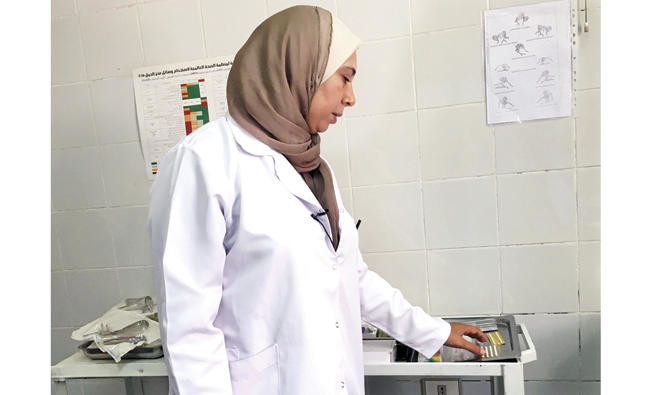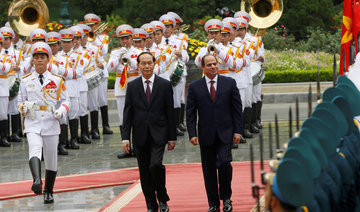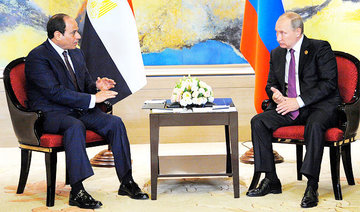CAIRO: Questions are being asked about the effectiveness of government initiatives to control Egypt’s population boom.
Since the 1980s, Egypt has struggled to control rapid population growth, with consecutive governments complaining about the resulting economic burden.
In 2016 alone, Egypt saw the birth of 2.6 million babies, the country’s statistics agency CAPMAS said.
The Health Ministry launched Operation Lifeline last month, to educate people in rural areas about birth control and family planning.
Egypt is the most populous Arab country, with 93 million citizens. That figure is set to grow to 128 million by 2030 if the fertility rate of four births per 1,000 women continues, according to government figures.
“Previous government efforts didn’t fail to curb population growth, otherwise we could’ve surpassed the current figures,” Ayman Zohry, a population and migration expert, told Arab News.
The population grew drastically in the wake of the 2011 uprising and subsequent years of social unrest, he said.
“Every birth averted will be very important to Egypt,” Zohry added, citing the serious implications of overpopulation on national development and security.
The Health Ministry aims to reduce the birth rate to 2.4 and save the government up to 200 billion Egyptian pounds ($11.3 billion) by 2030, Reuters reported.
The ministry will deploy 12,000 family-planning advocates to 18 rural provinces, but gave no details about how it will attract more women to the program.
Said Sadek, a professor of political sociology in Cairo, said to attract people in rural areas to family-planning programs, the government has to understand their perception of wanting to have more children, and how they view large families as a sign of economic strength.
“We’ve seen the upper and middle classes of Egyptian society respond to family planning, but we fail to see the effectiveness of government programs in rural areas, where a family could have six children born to uneducated parents,” he told Arab News.
“To address an issue this big, the government needs to reach opinion leaders in those areas who have the power to convince people of the importance of birth control.”
In previous attempts, Sadek said the government sent representatives who were strangers to rural communities to tell them not to have a lot of children.
President Abdel Fattah El-Sisi last month said the current population growth rate poses a threat to national development.
“The two biggest dangers that Egypt faces throughout its history are terrorism and population growth, and this challenge decreases Egypt’s chances of moving forward,” he said.
Several MPs have recently called for programs to limit the number of children per family. Some say families with more than three children should be deprived of government support for education and subsidized goods and public services.
“People should understand that rapid population growth has serious implications on the country’s economy, and thus will affect the current and coming generations,” Sadek said.
“Only a strong government can apply strict regulations on families that have more children by cutting subsidies.”
But Zohry said the government should not blame parents for having children, and cutting state support for non-abiding families punishes the newborn, not the parents. Such “negative incentives” will not succeed, he added.
Instead, the government should educate people, especially women, and improve reproductive health care, he said.
The Health Ministry runs nearly 6,000 family-planning clinics, where women receive free check-ups and can buy heavily subsidized contraceptives ranging from condoms at 0.10 Egyptian pounds to copper intrauterine devices at 2 Egyptian pounds.
Besides people in rural areas viewing large families as a source of economic strength, there is also resistance to birth control due to a belief that it is unlawful in Islam to aim to conceive a specific number of children.
But Egypt’s Al-Azhar, a 1,000-year-old seat of Islamic learning, said family planning is not forbidden.
Egypt delivers a drive to contain population boom, but are there any takers?
Egypt delivers a drive to contain population boom, but are there any takers?

Israel’s attorney general tells Netanyahu to reexamine extremist security minister’s role

- National Security Minister Itamar Ben-Gvir criticized for interfering in police matters
JERUSALEM, Nov 14 : Israel’s Attorney General told Prime Minister Benjamin Netanyahu to reevaluate the tenure of his far-right National Security Minister Itamar Ben-Gvir, citing his apparent interference in police matters, Israel’s Channel 12 reported on Thursday.
The news channel published a copy of a letter written by Attorney General Gali Baharav-Miara in which she described instances of “illegitimate interventions” in which Ben-Gvir, who is tasked with setting general policy, gave operational instructions that threaten the police’s apolitical status.
“The concern is that the government’s silence will be interpreted as support for the minister’s behavior,” the letter said.
Officials at the Justice Ministry could not be reached for comment and there was no immediate comment from Netanyahu’s office.
Ben-Gvir, who heads a small ultra-nationalist party in Netanyahu’s coalition, wrote on social media after the letter was published: “The attempted coup by (the Attorney General) has begun. The only dismissal that needs to happen is that of the Attorney General.”
Israeli forces demolish Palestinian Al-Bustan community center in Jerusalem

- Al-Bustan Association functioned as a primary community center in which Silwan’s youth and families ran cultural and social activities
LONDON: Israeli forces demolished the office of the Palestinian Al-Bustan Association in occupied East Jerusalem’s neighborhood of Silwan, whose residents are under threat of Israeli eviction orders.
The Palestinian Authority’s Ministry of Culture condemned on Thursday the demolition of Al-Bustan by Israeli bulldozers and a military police force.
The ministry said that “(Israeli) occupation’s arrogant practices against cultural and community institutions in Palestine, and specifically in Jerusalem, are targeting the Palestinian identity, in an attempt to obliterate it.”
Founded in 2004, the Al-Bustan Association functioned as a primary community center in which Silwan’s youth and families ran cultural and social activities alongside hosting meetings for diplomatic delegations and Western journalists who came to learn about controversial Israeli policies in the area.
Al-Bustan said in a statement that it served 1,500 people in Silwan, most of them children, who enrolled in educational, cultural and artistic workshops. In addition to the Al-Bustan office, Israeli forces also demolished a home in the neighborhood belonging to the Al-Qadi family.
Located less than a mile from Al-Aqsa Mosque and Jerusalem’s southern ancient wall, Silwan has a population of 65,000 Palestinians, some of them under threat of Israeli eviction orders.
In past years, Israeli authorities have been carrying out archaeological digging under Palestinian homes in Silwan, resulting in damage to these buildings, in search of the three-millennial “City of David.”
Israeli strike kills 12 after hitting civil defense center in Lebanon’s Baalbek, governor tells Reuters

- Eight others, including five women, were also killed and 27 wounded in another Israeli attack
CAIRO: An Israeli strike killed 12 people after it hit a civil defense center in Lebanon’s city of Baalbek on Thursday, the regional governor told Reuters adding that rescue operations were ongoing.
Eight others, including five women, were also killed and 27 wounded in another Israeli attack on the Lebanese city, health ministry reported on Thursday.
Meanwhile, Lebanese civil defense official Samir Chakia said: “The Civil Defense Center in Baalbek has been targeted, five Civil Defense rescuers were killed.”
Bachir Khodr the regional governor said more than 20 rescuers had been at the facility at the time of the strike.
‘A symbol of resilience’ — workers in Iraq complete reconstruction of famous Mosul minaret

- Workers complete reconstruction of 12th-century minaret of Al-Nuri Mosque
- Tower and mosque were blown by Daesh extremists in 2017
High above the narrow streets and low-rise buildings of Mosul’s old city, beaming workers hoist an Iraqi flag into the sky atop one of the nation’s most famous symbols of resilience.
Perched precariously on scaffolding in high-vis jackets and hard hats, the workers celebrate a milestone in Iraq’s recovery from the traumatic destruction and bloodshed that once engulfed the city.
On Wednesday, the workers placed the last brick that marked the completed reconstruction of the 12th-century minaret of Al-Nuri Mosque. The landmark was destroyed by Daesh in June 2017 shortly before Iraqi forces drove the extremist group from the city.
Known as Al-Hadba, or “the hunchback,” the 45-meter-tall minaret, which famously leant to one side, dominated the Mosul skyline for centuries. The tower has been painstakingly rebuilt as part of a UNESCO project, matching the traditional stone and brick masonry and incorporating the famous lean.
“Today UNESCO celebrates a landmark achievement,” the UN cultural agency’s Iraq office said. “The completion of the shaft of the Al-Hadba Minaret marks a new milestone in the revival of the city, with and for the people of Mosul.
“UNESCO is grateful for the incredible teamwork that made this vision a reality. Together, we’ve created a powerful symbol of resilience, a true testament to international cooperation. Thank you to everyone involved in this journey.”
The restoration of the mosque is part of UNESCO’s Revive the Spirit of Mosul project, which includes the rebuilding of two churches and other historic sites. The UAE donated $50 million to the project and UNESCO said that the overall Al-Nuri Mosque complex restoration will be finished by the end of the year.
UNESCO Director-General Audrey Azoulay celebrated the completion of the minaret by posting “We did it!” on social media site X.
She thanked donors, national and local authorities in Iraq and the experts and professionals, “many of whom are Moslawis,” who worked to rebuild the minaret.
“Can’t wait to return to Mosul to celebrate the full completion of our work,” she said.
The Al-Nuri mosque was built in the second half of the 12th century by the Seljuk ruler Nur Al-Din.
After Daesh seized control of large parts of Iraq in 2014, the group’s leader, Abu Bakr Al-Baghdadi, declared the establishment of its so-called caliphate from inside the mosque.
Three years later, the extremists detonated explosives to destroy the mosque and minaret as Iraqi forces battled to expel them from the city. Thousands of civilians were killed in the fighting and much of Mosul was left in ruins.
US hands Lebanon draft truce proposal -two political sources

- The US has sought to broker a ceasefire that would end hostilities between its ally Israel and Hezbollah
BEIRUT: The US ambassador to Lebanon submitted a draft truce proposal to Lebanon’s speaker of parliament Nabih Berri on Thursday to halt fighting between armed group Hezbollah and Israel, two political sources told Reuters, without revealing details.
The US has sought to broker a ceasefire that would end hostilities between its ally Israel and Iran-backed Hezbollah, but efforts have yet to yield a result. Israel launched a stepped-up air and ground campaign in late September after cross-border clashes in parallel with the Gaza war.





















